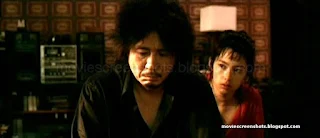Director: Siddharth Vishwanath
The one thing that man is granted in this life is free will and the freedom to act at his discretion (within the confines of social mores and the boundaries of the law). Therefore, when someone commits a crime that is deemed an affront to society's wellbeing, he is stripped of this privilege. Confined in isolation, it is believed that he will reflect on his waywardness and be spurred to make amends.
The reality, sadly, is not so clear-cut. We know of many innocent people incarcerated for being in the wrong place at the wrong time, doomed for life for crimes they did not commit. Then there are those who make jail their second home, moving in and out for petty crimes. I suppose imprisonment was no hindrance to the continuation of their daytime trades. Not to mention those who wear their jail sentences like badges of honour and the select few who still exert influence and control over activities outside the confines of their four walls. Who says they are missing the luxuries they left behind after their conviction? They continue receiving the salutations and the honours they were conferred as if they were wrongly convicted. It is as if the entire pillar of law and order is wrong.
We all know how Charles Sobhraj, the Bikini Killer, wielded significant influence in Tihar Jail in Delhi that he could even hold his birthday party. He arranged for sedative-laced laddus to poison the guards and execute his escape. Closer to home, rumours abound regarding a certain ex-PM receiving special deliveries of Kajang Satay and full access to his Armani suits for his numerous court appearances. The jail sentence does not hinder the man from occasionally updating his Twitter handle. What could be more bizarre than a prisoner masterminding an assassination thousands of miles away, as in the case of Lawrence Bishnoi and the killing of Khalistani supporter Hardeep Singh Nijjar? Bishnoi, through his extensive international connections while sitting in Sabarmati Jail in Ahmedabad, is accused by the Royal Canadian Mounted Police of colluding with the Indian government to eliminate the Khalistani troublemaker.
Let's not forget the innumerable small-time crooks who graduate to bigger crimes after receiving invaluable coaching from fellow inmates. Jails seem to be not correctional facilities but rather a conduit for producing more anarchy, like a bacteriophage injecting its wisdom into an empty shell to produce more young, lethal viruses. Taxpayers seem to be paying for all the crooks to be concentrated in one locale so that all the bigwig crooks can streamline their expertise into creating the mother of all mayhems.
The film is loosely based on the 1999 riots at Chennai Central Prison, one of India's oldest prisons, which was built by the British in 1837. The jail was closed in 2006, and its inmates were relocated to Puzhal Central Prison. Notable figures who were imprisoned here include Subhas Chandra Bose, Tamil Nadu Chief Ministers Anna Durai, Karunanidhi, Jayalalithaa, and LTTE leader Velupillai Prabhakaran.
The 1999 riot involved a criminal named Boxer Vadivelu, who had the support of the AAIDMK. He seemingly brought his thuggish behaviour into the prison and instigated a gangland showdown. The riot escalated to such a degree that the riot police were called in. They were forced to respond with violence and live ammunition, resulting in the deaths of ten people, including a prison official. The film begins after the riot, with a solitary member of the enquiry panel attempting to determine the causes that led to the confrontation. Through a series of interviews with various inmates and prison staff, we receive a comprehensive view of the prison dynamics and the events leading up to the riot. Similar to Rashomon's narrative style, we obtain slightly differing and contradictory accounts of what actually transpired from various witnesses.
P.S. A memorable quote:
"There are only two paths in life: either kneel down in Heaven or be the King in Hell."
.jpeg)

.jpeg)










